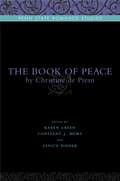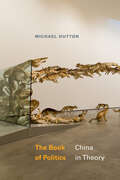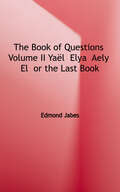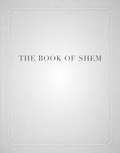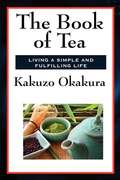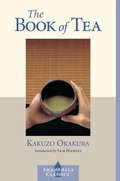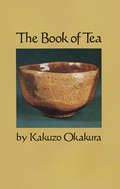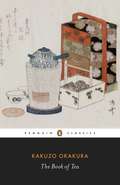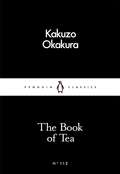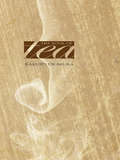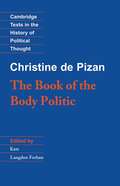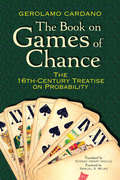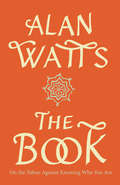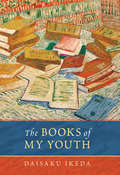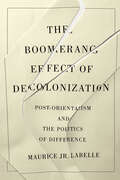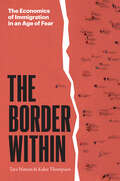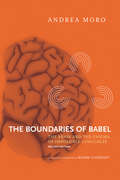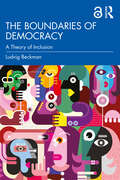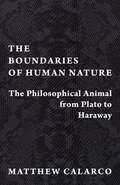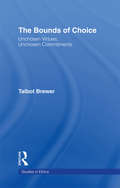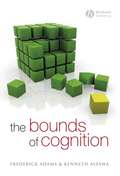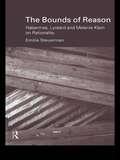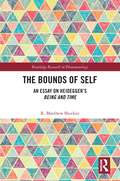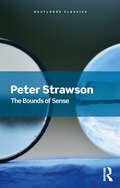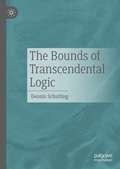- Table View
- List View
The Book of Peace: By Christine de Pizan (Penn State Romance Studies #5)
by Karen Green Constant J. Mews Janice PinderChristine de Pizan, one of the earliest known women authors, wrote the Livre de paix (Book of Peace) between 1412 and 1414, a period of severe corruption and civil unrest in her native France. The book offered Pizan a platform from which to expound her views on contemporary politics and to put forth a strict moral code to which she believed all governments should aspire. The text’s intended recipient was the dauphin, Louis of Guyenne; Christine felt that Louis had the political and social influence to fill a void left by years of incompetent leadership. Drawing in equal parts from the Bible and from classical ethical theory, the Livre de paix was revolutionary in its timing, viewpoint, and content. This volume, edited by Karen Green, Constant J. Mews, and Janice Pinder, boasts the first full English translation of Pizan’s work along with the original French text. The editors also place the Livre de paix in historical context, provide a brief biography of Pizan, and offer insight into the translation process.
The Book of Politics: China in Theory (Asia-Pacific: Culture, Politics, and Society)
by Michael DuttonIn The Book of Politics, Michael Dutton offers an affective theorization of the political and a political theorization of affect. Drawing on Western and Chinese social theory and practice, Dutton rethinks Carl Schmitt’s insistence that the political can be thought of only within the antagonistic pairing of friend and enemy. Dutton shows how the power of the friend/enemy binary must be understood by conceptualizing the political as the channeling, harnessing, and transforming of affective energy flows in relation to that binary. Given this affective nature of politics, Dutton contends that to rethink the political means moving away from a political science toward an art of the political. Such an art highlights fluidity and pulls away from Eurocentric political theory, requiring a conceptualization of the political as global. He juxtaposes ancient Chinese cosmology, medicine, and Maoism against the monuments of early capitalist modernity such as the Crystal Palace and the Eiffel Tower to highlight the differences in political investments and intensities. From the Chinese revolution to the global rise of right-wing movements, Dutton rethinks politics in the contemporary world.
The Book of Questions: Yaël; Elya, Aely, El, or The Last Book
by Edmond JabèsA meditative narrative of Jewish Experience and man's relation to the world. The Book of Questions, of which volumes IV, V, VI are together published here, is a meditative narrative of Jewish Experience, and, more generally, man's relation to the world. <p<p>In these volumes the word is personified in the woman Yaël, silence in her still-born child Elya. Even though words imply ambiguity and lies, they are the home of the exile. A book becomes the Book, fragments of the law that are in some way unified, where past and present, the visionary, and the common place, encounter each other. For Jabès every word is a question in the book of being. Man defines himself in the world against all that threatens his existence- death, the infinite, silence, that is, God, his primal opponent. How can one speak what cannot be spoken?
The Book of Shem: On Genesis before Abraham
by David KishikCan anyone say anything that has not already been said about the most scrutinized text in human history? In one of the most radical rereadings of the opening chapters of Genesis since The Zohar, David Kishik manages to do just that. The Book of Shem, a philosophical meditation on the beginning of the Bible and the end of the world, offers an inspiring interpretation of this navel of world literature. The six parts of the primeval story—God's creation, the Garden of Eden, Cain and Abel, Noah's Ark, the first covenant, and the Tower of Babel—come together to address a single concern: How does one become the human being that one is? By closely analyzing the founding text of the Abrahamic religions, this short treatise rethinks some of their deepest convictions. With a mixture of reverence and violence, Kishik's creative commentary demonstrates the post-secular implications of a pre-Abrahamic position. A translation of the Hebrew source, included as an appendix, helps to peel away the endless layers of presuppositions about its meaning.
The Book of Tea
by Kakuzo OkakuraThe Book of Tea by Okakura Kakuzo shows how Tea has affected nearly every aspect of Japanese culture, thought, and life. The book is accessible to Western audiences because, though Kakuzo was born and raised Japanese, he was trained from a young age to speak English. In this book he explains tea in the context of Zen and Taoism as well as the secular aspects of Tea and Japanese life. This book emphasizes how Teaism taught the Japanese many things; most importantly, simplicity. Kakuzo argues that this tea-induced simplicity affected Japanese art and architecture. A clear guide to living a simple and fulfilling life. Wilder Publications is a green publisher. All of our books are printed to order. This reduces waste and helps us keep prices low while greatly reducing our impact on the environment.
The Book of Tea
by Kakuzo OkakuraThis modern classic invites the reader to discover a unique tradition that has come to symbolize wisdom, beauty, and the elegant simplicity of Asian culture. The author celebrates the Way of Tea from its ancient origins in Chinese Taoism to its culmination in the Zen discipline known as the Japanese tea ceremony--an enchanting practice bringing together such arts as architecture, pottery, and flower arranging to create an experience that delights the senses, calms the mind, and refreshes the spirit. Combining the rich aesthetic of Asian culture through the history, philosophy, and practice of tea, The Book of Tea has been enjoyed by hundreds of thousands of readers since it was first published in 1906.
The Book of Tea
by Kakuzo OkakuraKakuzo Okakura, who was known in America as a scholar, art critic, and Curator of Chinese and Japanese Art at the Boston Museum of Fine Arts, directed almost his entire adult life toward the preservation and reawakening of the Japanese national heritage — in art, ethics, social customs, and other areas of life — in the face of the Westernizing influences that were revolutionizing Japan around the turn of the century.This modern classic is essentially an apology for Eastern traditions and feelings to the Western world — not in passionate, oversentimental terms, but with a charm and underlying toughness which clearly indicate some of the enduring differences between the Eastern and Western mind. Okakura exhibits the distinctive "personality" of the East through the philosophy of Teaism and the ancient Japanese tea ceremony. This ceremony is particularly revelatory of a conservative strain in Japanese culture; its ideals of aesthetic tranquility and submission to the ways of the past find no parallel in the major cultural motifs of the West.Not only does he discuss the tea ceremony and its rigid formalities, and the cult and patterns of belief surrounding tea and tea-drinking, but Okakura also considers religious influences, origins, and history, and goes into the importance of flowers and floral arrangements in Japanese life — their proper appreciation and cultivation, great tea-masters of the past, the tea-room with its air of serenity and purity, and the aesthetic and quasi-religious values pervading all these activities and attitudes.Okakura's English style was graceful, yet exceptionally clear and precise, and this book is one of the most delightful essay-volumes to the English language. It has introduced hundreds of thousands of American readers to Japanese thinking and traditions. This new, corrected edition, complete with an illuminating preliminary essay on Okakura's life and work, will provide an engrossing account for anyone interested in the current and central themes of Oriental life.
The Book of Tea
by Kakuzo OkakuraFor a generation adjusting painfully to the demands of a modern industrial and commercial society, Asia came to represent an alternative vision of the good life: aesthetically austere, socially aristocratic, and imbued with spirituality. The Book of Tea was originally written in English and sought to address the inchoate yearnings of disaffected Westerners. In a flash of inspiration, Okakura saw that the formal tea party as practiced in New England was a distant cousin of the Japanese tea ceremony, and that East and West had thus "met in the tea-cup."
The Book of Tea (Penguin Little Black Classics)
by Kakuzo Okakura'Meanwhile, let us have a sip of tea. The afternoon glow is brightening the bamboos, the fountains are bubbling with delight, the soughing of the pines is heard in our kettle.'In this charming book from 1906, Okakura explores Zen, Taoism, Tea Masters and the significance of the Japanese tea ceremony.One of 46 new books in the bestselling Little Black Classics series, to celebrate the first ever Penguin Classic in 1946. Each book gives readers a taste of the Classics' huge range and diversity, with works from around the world and across the centuries - including fables, decadence, heartbreak, tall tales, satire, ghosts, battles and elephants.
The Book of Tea: A Japanese Harmony Of Art Culture And The Simple Life (Ideas For Life Ser.)
by Kakuzo Okakura Everett BleilerKakuzo Okakura, who was known in America as a scholar, art critic, and Curator of Chinese and Japanese Art at the Boston Museum of Fine Arts, directed almost his entire adult life toward the preservation and reawakening of the Japanese national heritage -- in art, ethics, social customs, and other areas of life -- in the face of the Westernizing influences that were revolutionizing Japan around the turn of the century.This modern classic is essentially an apology for Eastern traditions and feelings to the Western world -- not in passionate, oversentimental terms, but with a charm and underlying toughness which clearly indicate some of the enduring differences between the Eastern and Western mind. Okakura exhibits the distinctive "personality" of the East through the philosophy of Teaism and the ancient Japanese tea ceremony. This ceremony is particularly revelatory of a conservative strain in Japanese culture; its ideals of aesthetic tranquility and submission to the ways of the past find no parallel in the major cultural motifs of the West.Not only does he discuss the tea ceremony and its rigid formalities, and the cult and patterns of belief surrounding tea and tea-drinking, but Okakura also considers religious influences, origins, and history, and goes into the importance of flowers and floral arrangements in Japanese life -- their proper appreciation and cultivation, great tea-masters of the past, the tea-room with its air of serenity and purity, and the aesthetic and quasi-religious values pervading all these activities and attitudes.Okakura's English style was graceful, yet exceptionally clear and precise, and this book is one of the most delightful essay-volumes to the English language. It has introduced hundreds of thousands of American readers to Japanese thinking and traditions. This new, corrected edition, complete with an illuminating preliminary essay on Okakura's life and work, will provide an engrossing account for anyone interested in the current and central themes of Oriental life.
The Book of the Body Politic
by Christine De PizanThis is the first translation into modern English of Christine de Pizan's major political work, The Book of the Body Politic (c. 1407). Written during the Hundred Years' War by France's first female professional writer, it discusses the education and behavior appropriate for princes, nobility and common people, so that all classes can understand their responsibilities toward society as a whole. The product of a time of unrest and disorder, the book provides a fascinating view of politics from the perspective of an educated woman.
The Book on Games of Chance: The 16th-Century Treatise on Probability (Dover Recreational Math)
by Samuel S. Wilks Gerolamo Cardano Sydney Henry GouldMathematics was only one area of interest for Gerolamo Cardano - the sixteenth-century astrologer, philosopher, and physician was also a prolific author and inveterate gambler. Gambling led Cardano to the study of probability, and he was the first writer to recognize that random events are governed by mathematical laws. Published posthumously in 1663, Cardano's Liber de ludo aleae (Book on Games of Chance) is often considered the major starting point of the study of mathematical probability. The Italian scholar formulated some of the field's basic ideas more than a century before the better-known correspondence of Pascal and Fermat. Although his book had no direct influence on other early thinkers about probability, it remains an important antecedent to later expressions of the science's tenets.
The Book: On the Taboo Against Knowing Who You Are
by Alan WattsA revelatory primer on what it means to be human and a mind-opening manual of initiation into the central mystery of existence, by &“perhaps the foremost interpreter of Eastern disciplines for the contemporary West" (Los Angeles Times). At the root of human conflict is our fundamental misunderstanding of who we are. The illusion that we are isolated beings, unconnected to the rest of the universe, has led us to view the &“outside&” world with hostility, and has fueled our misuse of technology and our violent and hostile subjugation of the natural world. To help us understand that the self is in fact the root and ground of the universe, Alan Watts provides us with a much-needed answer to the problem of personal identity, distilling and adapting the Hindu philosophy of Vedanta.
The Books of My Youth
by Daisaku IkedaDaisaku Ikeda's well-known passion for reading leaps from the pages of The Books of My Youth. This tour of world-class literature he read as a young man—books, he says, that helped form his life's "spiritual framework"—will delight and inspire.Here we meet heroes and heroines, revolutionaries and villains. We hear poets singing their praises of the human spirit. We engage with philosophers who challenge the status quo as they illuminate a new way forward.Come, thrill to the discovery of how great literature can inform and bolster our Buddhist practice to bring peace and justice to the world today.
The Boomerang Effect of Decolonization: Post-Orientalism and the Politics of Difference
by Maurice LabelleThe 1978 publication of Edward Said's Orientalism unsettled the world. Over two decades earlier Aimé Césaire had famously spoken of the boomerang effect of colonization, which dehumanized both the colonizer and the colonized. Over time, Said and his 1978 book took Césaire’s anti-imperial critique one step further by enabling the boomerang effect of decolonization.Inspired by that intellectual trajectory, The Boomerang Effect of Decolonization redefines post-Orientalism in a relational and integrative way. This volume draws on the reception and critique of Said’s ideas as well as his own attempts to appropriate the boomerang’s recursive nature and empower decolonial processes that aimed to transform everyone, regardless of differences both imagined and real, for the betterment of all. Reflecting upon Orientalism, its legacies, and the myriad conversations it has generated, scholars from various disciplines examine acts of anti-racism and liberation through the lens of critical race theory. Covering topics including Said’s anti-Orientalist world, Métis/Michif consciousness, writing by the French scholar Jacques Berque, the politics of allyship in the Israeli-Palestinian conflict, and the convergence between healthcare and settler-colonialism in Northwestern Ontario, contributors explore the different paths critiques of imperial cultures and their politics of difference have travelled in Canada and abroad. Said’s Orientalism reoriented both decolonization itself and his readers’ imaginations. By redefining post-Orientalism as a relational and inclusive mode of liberation, this volume offers tools to think about difference differently, centring its anti-racist framework on the relationship between misrepresented people and their rewritten histories. Contributors include Yasmeen Abu-Laban (Alberta), Rachad Antonius (UQAM), Sung Eun Choi (Bentley), Mary-Ellen Kelm (Simon Fraser), Allyson Stevenson (Saskatchewan), Mira Sucharov (Carleton), and Lorenzo Veracini (Swinborne).
The Border Within: The Economics of Immigration in an Age of Fear
by Kalee Thompson Tara WatsonAn eye-opening analysis of the costs and effects of immigration and immigration policy, both on American life and on new Americans. For decades, immigration has been one of the most divisive, contentious topics in American politics. And for decades, urgent calls for its policy reform have gone mostly unanswered. As the discord surrounding the modern immigration debate has intensified, border enforcement has tightened. Crossing harsher, less porous borders makes unauthorized entry to the United States a permanent, costly undertaking. And the challenges don’t end on the other side. At once enlightening and devastating, The Border Within examines the costs and ends of America’s interior enforcement—the policies and agencies, including ICE, aimed at removing immigrants already living in the country. Economist Tara Watson and journalist Kalee Thompson pair rigorous analysis with deeply personal stories from immigrants and their families to assess immigration’s effects on every aspect of American life, from the labor force to social welfare programs to tax revenue. What emerges is a critical, utterly complete examination of what non-native Americans bring to the country, including immigration’s tendency to elevate the wages and skills of those who are native-born. News coverage has prompted many to question the humanity of American immigration policies; The Border Within opens a conversation of whether it is effective. The United States spends billions each year on detention and deportation, all without economic gain and at a great human cost. With depth and discipline, the authors dissect the shock-and-awe policies that make up a broken, often cruel system, while illuminating the lives caught in the chaos. It is an essential work with far-reaching implications for immigrants and non-immigrants alike.
The Boundaries of Babel, second edition: The Brain and the Enigma of Impossible Languages (Current Studies in Linguistics #46)
by Andrea MoroThe new edition of a pioneering book that examines research at the intersection of contemporary theoretical linguistics and the cognitive neurosciences.In The Boundaries of Babel, Andrea Moro describes an encounter between two cultures: contemporary theoretical linguistics and the cognitive neurosciences. As a leading theoretical linguist in the generative tradition and also a neuroscientist, Moro is uniquely equipped to tell this story. Moro examines what he calls the “hidden” revolution in contemporary science: the discovery that the number of possible grammars is not infinite and that their number is biologically limited. This will require us to rethink not just the fundamentals of linguistics and neurosciences but also our view of the human mind. Moro searches for neurobiological correlates of “the boundaries of Babel”—the constraints on the apparent chaotic variation in human languages—by using an original experimental design based on artificial languages exploiting neuroimaging techniques. This second edition includes a new chapter in which Moro extends the exploration of the boundaries of Babel in search of the source of order with which all human languages are endowed. Reflecting on the emerging methodology that obtains physiological data from awake brain surgery, Moro shifts from considering where the neurophysiological processes underlying linguistic competence take place—that is, where neurons are activated—to considering the neuronal code involved in these processes—that is, what neurons communicate to each other. This edition also features a substantive new foreword by Noam Chomsky synthesizing the major issues theoretical syntax will face in the near future.
The Boundaries of Democracy: A Theory of Inclusion
by Ludvig BeckmanThis book provides a general theory of democratic inclusion for the present world. It presents an original contribution to our understanding of the democratic ideal by explaining how democratic inclusion can apply to individuals in a variety of contexts: the workplace, social clubs, religious institutions, the family, and, of course, the state. The book explores the problem of democratic inclusion, what it means to be subject to de facto authority, how this conception translates into legal systems, and the relationship between territorial claims by the state, and law’s claim to legitimate authority. The volume will be of interest to scholars and researchers of politics, especially political theory and democracy.
The Boundaries of Human Nature: The Philosophical Animal from Plato to Haraway
by Matthew CalarcoAre animals capable of wonder? Can they be said to possess language and reason? What can animals teach us about how to live well? How can they help us to see the limitations of human civilization? Is it possible to draw firm distinctions between humans and animals? And how might asking and answering questions like these lead us to rethink human-animal relations in an age of catastrophic ecological destruction?In this accessible and engaging book, Matthew Calarco explores key issues in the philosophy of animals and their significance for our contemporary world. He leads readers on a spirited tour of historical and contemporary philosophy, ranging from Plato to Donna Haraway and from the Cynics to the Jains. Calarco unearths surprising insights about animals from a number of philosophers while also underscoring ways in which the philosophical tradition has failed to challenge the dogma of human-centeredness. Along the way, he indicates how mainstream Western philosophy is both complemented and challenged by non-Western traditions and noncanonical theories about animals. Throughout, Calarco uses examples from contemporary culture to illustrate how philosophical theories about animals are deeply relevant to our lives today. The Boundaries of Human Nature shows readers why philosophy can help transform not just the way we think about animals but also how we interact with them.
The Bounds of Choice: Unchosen Virtues, Unchosen Commitments (Studies in Ethics)
by Talbot BrewerPresents a sustained and original challenge to the orthodox understanding of the relationship between morality and voluntary choice. The two main theses of the book are that we can be morally responsible for aspects of our character that we have not chosen or otherwise authored, and that we can enter into interpersonal commitments to which we have not voluntarily consented.
The Bounds of Cognition
by Frederick Adams Kenneth AizawaAn alarming number of philosophers and cognitive scientists have argued that mind extends beyond the brain and body. This book evaluates these arguments and suggests that, typically, it does not. A timely and relevant study that exposes the need to develop a more sophisticated theory of cognition, while pointing to a bold new direction in exploring the nature of cognition Articulates and defends the “mark of the cognitive”, a common sense theory used to distinguish between cognitive and non-cognitive processes Challenges the current popularity of extended cognition theory through critical analysis and by pointing out fallacies and shortcoming in the literature Stimulates discussions that will advance debate about the nature of cognition in the cognitive sciences
The Bounds of Reason: Habermas, Lyotard and Melanie Klein on Rationality (Problems of Modern European Thought)
by Emilia SteuermanThe Bounds of Reason: Habermas, Lyotard & Melanie Klein on Rationality is a highly original yet accessible study of the debate between modernity and postmodernity. Emilia Steuerman clearly explains the modernity/postmodernity dispute by examining the problem that has driven the whole debate: whether the use of reason is an emancipatory or enslaving force. Steuerman clearly sets out this debate by critically examining the arguments of two of its key proponents, Jurgen Habermas and Jean-François Lyotard. She clearly explains Habermas' defence of modernity and his attempt to salvage Enlightenment ideas of truth, justice, and freedom through the use of reason. She contrasts this with Lyotard's postmodernism and his scepticism about the use of reason, and its claims to universalism and objectivity. Throughout, Steuerman contrasts the Habermas-Lyotard debate with important insights from psychoanalytic theory, and shows how Habermas' notions of intersubjectivity and a community of shared language users can be compared and contrasted with Melanie Klein's theory of object relations.
The Bounds of Self: An Essay on Heidegger's Being and Time (Routledge Research in Phenomenology)
by R. Matthew ShockeyThis book provides a systematic reading of Martin Heidegger’s project of “fundamental ontology,” which he initially presented in Being and Time (1927) and developed further in his work on Kant. It shows our understanding of being to be that of a small set of a priori, temporally inflected, “categorial” forms that articulate what, how, and whether things can be. As selves bound to and bounded by the world within which we seek to answer the question of how to live, we imaginatively generate these forms in order to open ourselves up to those intra-worldly entities which determinately instantiate them. This makes us, as selves, the source and unifying ground of being. But this ground is hidden from us – until we do fundamental ontology. In showing how Heidegger develops these ideas, the author challenges key elements of the anti-Cartesian framework that most readers bring to his texts, arguing that his Kantian account of being has its roots in the anti-empiricism and Augustinianism of Descartes, and that his project relies implicitly on an essentially Cartesian “meditational” method of reflective self-engagement that allows being to be brought to light. He also argues against the widespread tendency to see Heidegger as presenting the basic forms of being as in any way normative, from which he concludes, partially against Heidegger himself, that fundamental ontology is, while profound and worth pursuing for its own sake, inert with respect to the question of how to live. The Bounds of Self will be of interest to researchers and advanced students working on Heidegger, Kant, phenomenology, and existential philosophy.
The Bounds of Sense: An Essay on Kant’s Critique of Pure Reason (Routledge Classics)
by Peter StrawsonPeter Strawson (1919–2006) was one of the leading British philosophers of his generation and an influential figure in a golden age for British philosophy between 1950 and 1970. The Bounds of Sense is one of the most influential books ever written about Kant’s philosophy, and is one of the key philosophical works of the late twentieth century. Whilst probably best known for its criticism of Kant’s transcendental idealism, it is also famous for the highly original manner in which Strawson defended and developed some of Kant’s fundamental insights into the nature of subjectivity, experience and knowledge – at a time when few philosphers were engaging with Kant’s ideas. The book had a profound effect on the interpretation of Kant’s philosophy when it was first published in 1966 and continues to influence discussion of Kant, the soundness of transcendental arguments, and debates in epistemology and metaphysics generally. This Routledge Classics edition includes a new foreword by Lucy Allais.
The Bounds of Transcendental Logic
by Dennis SchultingThe book addresses two main areas of Kant’s theoretical philosophy: the doctrine of transcendental idealism and various central aspects of the arguments from the Metaphysical and Transcendental Deductions, as well as the relation between the deduction argument and idealism.Among the topics covered are the nature of objective validity, the role and function of transcendental logic in relation to general or formal logic, the possibility of contradictory thoughts, the meaning of the Leitfaden at A79 and the unity of cognition, the two-steps-in-one-proof interpretation and categorial instantiation, categorial illusion, Strawson’s transcendental argument, the persistently perplexing question of the derivation of the categories, and the relation between apperception, objectivity, judgement, and idealism.With regard to idealism in particular, the focus is on the metaphysical two-aspect interpretation and its problems, on the merits and demerits of the controversial phenomenalist reading of Kant’s idealism, and on the topic of subjectivism and epistemic humility.In all of the aforementioned topics, the book presents wholly novel interpretations compared to the standard or mainstream interpretations
